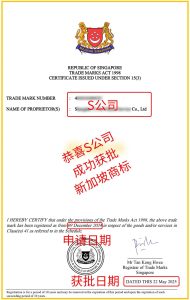Win the future with your brand! S Company’s Singapore trademark registration case study: successfully secured a Singapore trademark in less than six months.

I. How did S Company secure the trademark in six months?
In the fiercely competitive health services industry, S Company recognised the importance of brand strategy early on. As an innovative company specialising in ‘mind-body health courses’ and ‘health training platforms,’ they submitted a trademark application to the Intellectual Property Office of Singapore (IPOS) on 9 December 2024, aiming to secure brand recognition rights before expanding into the local market.
As a result, they successfully obtained the trademark registration certificate for Class 41 in less than 6 months (officially approved on 22 May 2025). This category covers core business areas such as education and training, entertainment services, and fitness guidance, which align perfectly with S Company’s key strategic directions for the next three years.
Notably, while the average trademark registration process in Singapore takes approximately 6–9 months, S Company did not utilise an expedited mechanism. Instead, they significantly reduced the waiting time through meticulous preparation and professional application submission.
Their success story sends a clear message to many small and medium-sized enterprises: it is not just large companies that should register trademarks; growing companies, in particular, need a ‘brand moat.’

Image/S Company successfully obtained Singapore trademark registration; unauthorised use of this image will be prosecuted!

II. The Three Practical Advantages of Singapore Trademarks
Why did Company S choose to register its trademark in Singapore? This was not a coincidence but based on the following considerations:
1. A well-established legal system ensures brand rights protection
Singapore is a member of the Paris Convention and the Madrid Protocol, boasting a modern intellectual property legal framework. Once registered, a trademark enjoys exclusive rights for 10 years and can be renewed indefinitely, provided it is continuously used, ensuring long-term brand protection.
More importantly, Singaporean courts efficiently adjudicate intellectual property cases with clear compensation standards, effectively deterring infringement.
2. Wide Coverage, Facilitating Brand Expansion Abroad
Registering a trademark in Singapore not only protects the local market but also serves as the foundation for international applications, enabling seamless submission to multiple countries via the Madrid System.
For companies like S Company targeting the ‘Asia + international market,’ this is the most cost-effective and efficient starting point for global expansion.
3. Transparent application process and convenient digital operations
Unlike some countries that rely on paper-based submissions, the Singapore Intellectual Property Office (IPOS) offers fully online operations for the entire process, including searches, submissions, payments, and status tracking. Applicants only need to prepare the trademark design, category description, and company information, and the initial submission can be completed in as little as a few hours.
The IPOS official website also provides a public database, allowing companies to independently search for existing trademarks and avoid the risk of trademark conflicts.

III. Master these techniques for efficient trademark registration
Want to secure a trademark as quickly as Company S? Here are some practical strategies to consider:
1. Conduct a ‘trademark search’ in advance
Many companies discover during the application process that the name has already been registered, leading to delays. It is recommended to use IPOS’s public system to conduct a ‘similar trademark search’ in advance to rule out potential conflicts. If unsure about similarity, you may also hire a professional agency for an initial assessment.
2. Select categories and descriptions accurately
Trademark applications are categorised according to the ‘Nice Classification,’ with different categories corresponding to different business types. For example, Company S selected Class 41, which covers ‘education, training, fitness services,’ etc., falling under service-related categories.
It is recommended to use the ‘pre-approved descriptions’ provided by IPOS, which can accelerate the review process and reduce the risk of rejection.
3. Keep application materials concise and compliant
Submitted content must align with actual business operations, avoiding overly broad or ambiguous descriptions. Designs must be clear and unambiguous, and colour versions are recommended for submission (black-and-white + colour) to allow for greater flexibility in future use.
4. Monitor subsequent announcements and the opposition period
After a trademark application is accepted, it is typically published in the Singapore Official Gazette for two months. During this period, any third party may file an opposition. S Company did not encounter any objections during this phase, thanks to its proactive screening efforts. It is recommended that companies assign dedicated personnel or engage an agency to monitor the gazette and respond to feedback.
5. Registration is not the end; it must be put into use
Singaporean law stipulates that trademarks unused for five consecutive years may be subject to cancellation by others. Therefore, companies should actively use the trademark on their official websites, promotional materials, contract documents, etc., to demonstrate its active use through ‘actual use.’
Conclusion: Trademarks are a cost-effective competitive advantage for businesses.
S Company’s swift trademark registration not only secured brand recognition rights but also gained a competitive edge for its next phase of market expansion.
In a highly open and legally sound market like Singapore, the earlier you establish intellectual property rights, the better you can prevent future passive enforcement. Especially for industries such as startups, technology services, and content platforms, trademarks are not a luxury but a necessary barrier.
Trademark registration is not difficult, but its true value lies in the long-term trust and exclusive rights it represents. Like Company S, by leveraging professionalism, strategy, and execution, one can secure a brand’s ‘identity document’ in just six months.
If you are also considering registering a trademark in Singapore, why not take the first step today?
Note: Reference materials sourced from the Singapore Intellectual Property Office (IPOS), Accounting and Corporate Regulatory Authority (ACRA), and compiled from public news reports. Reproduction must credit the source.
